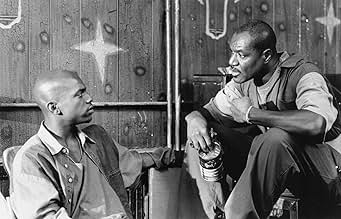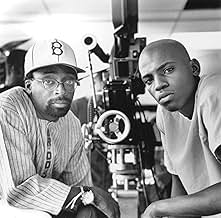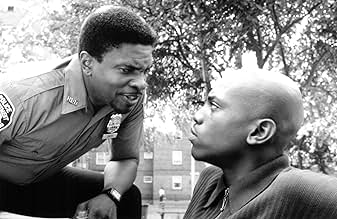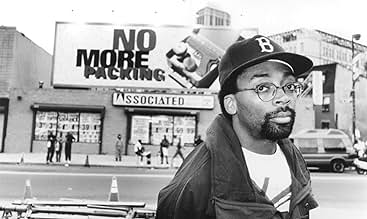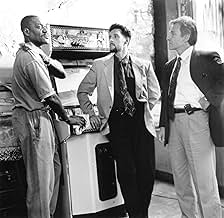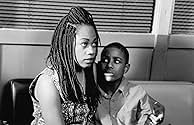De jeunes trafiquants de drogue dans les quartiers de Brooklyn mènent une vie dure et dangereuse, pris au piège entre les injonctions de leurs supérieurs et la traque des inspecteurs qui che... Tout lireDe jeunes trafiquants de drogue dans les quartiers de Brooklyn mènent une vie dure et dangereuse, pris au piège entre les injonctions de leurs supérieurs et la traque des inspecteurs qui cherchent à les arrêter.De jeunes trafiquants de drogue dans les quartiers de Brooklyn mènent une vie dure et dangereuse, pris au piège entre les injonctions de leurs supérieurs et la traque des inspecteurs qui cherchent à les arrêter.
- Prix
- 6 nominations au total
- Tyrone
- (as Pee Wee Love)
- Errol Barnes
- (as Tom Byrd)
- Go
- (as Fredro)
- Horace
- (as E.O. Nolasco)
- Sharon
- (as Lisa Arrindell Anderson)
Histoire
Le saviez-vous
- AnecdotesWas originally supposed to be directed by Martin Scorsese. Rocco Klein would have been the main character, played by Robert De Niro. Scorsese changed his mind, opting instead to direct Casino (1995), and De Niro went with him. Scorsese then asked Spike Lee if he wanted to direct. Lee accepted (and decided that Strike, not Rocco, would be the primary character), and Scorsese was given an "Executive Producer" credit.
- GaffesWhen Detective Mazilli is walking up to the back of the Mercedes Benz to talk to the kids inside his badge/shield is that of an NYPD Detective. However when he shows it to the driver of the car it is the shield of a NYPD Sergeant.
- Citations
Rodney: If God created anything better than crack cocaine, he kept that shit for hisself. I mean, that shit is like truth serum. It will truly expose who you are. I mean, you happen to be a low-life rat bastard motherfucker, who will sell off his newborn for a suck off that glass dick, crack will bring it right on in the light. Now, I don't care you black, white, Chinese, rich, poor. You take that first hit, you on a mission. And that mission will never end. Even when the house, the money, loved ones are gone, they send you to the joint, you still gonna try to cop.
Ronald 'Strike' Dunham: No doubt.
Rodney: Only time it ends, Strike, that mission, when you six feet under.
- ConnexionsFeatured in Crooklyn Dodgers: Return of the Crooklyn Dodgers (1995)
It is not an easy film. It is bleak and at times very off-putting. Actually, if you are a thinking, caring person, this is movie is overall heart-breaking.
But it is brilliant and, for the person who truly tries to understand it, a compelling, insightful look at the problems killing black America today. The only reason for the film's lack of recognition I can imagine is that its subject matter had been examined a number of times before. But the inescapable fact is that this one of the best examinations of the subject matter there has been on screen - on par with "Boyz N The Hood".
And it is FAR from uncreative. In fact, on one level, it is not a "hood" movie, but a whodunit. The mystery aspect of the plot is very interesting. But there are other, more important layers. It is the story of the confusion and crisis of a young man's life. Most importantly, it is a brutal look at drugs, guns, and life in the projects. It is a movie asking why so many young black men are dying in the streets.
The lead character Strike has a stomach problem. It might be an ulcer or something like that. I believe it is a metaphor. Just as heat represented racial tension in Lee's masterpiece "Do The Right Thing", Strike's sickness represents the illnesses plaguing the ghetto: drugs, guns, liquor.
Like DTRT, this film looks at community. The mothers, the cops, the young people, the kids, the men trying to make a living - there is eloquent commentary in "Clockers" on the situations of all. In Spike's movies, paying a little attention is rewarding. A good essay could be written on what I call the Spike Summarization technique. This is when Spike compresses a serious debate or concern in the black community into a few expressive moments of action or dialogue. There are better examples in other movies, but it manifests in "Clockers" a few times. A bunch of kids are sitting in front of Rodney's (Delroy Lindo) shop; one of the kids is rapping while the others pay attention. The two sides to the coin: we feel the artistry and skill of the moment, the continuation of a rich tradition of oral art; we're also struck by the cruelty and coldness in the kid's violent lyrics, and we think about where that comes from.
Stylistically, this movie is a huge success. The cinematography is amazing, and I wonder what must be wrong with my tastes when I'm floored by a film like this and find visually bland a more oft-praised classic. The projects become blinding panoramas, landscapes which add tons of meaning to the poignant ending (I won't reveal it here). The sound is great; many films of this nature use hip hop in the soundtrack to produce certain effects, but "Clockers" does it in a more methodical way which jars some people, but contributes to the film's meaning.
I could say more about the film, but I encourage you to just see it, along with the rest of Spike's oeuvre. He's not a perfect filmmaker, and some of his best films are marred by elements that don't work, but I feel his consistency in terms of delivering brilliance is not below most of the cinema's most celebrated auteurs.
- chikejeffers
- 13 avr. 2001
- Lien permanent
Meilleurs choix
- How long is Clockers?Propulsé par Alexa
Détails
Box-office
- Budget
- 25 000 000 $ US (estimation)
- Brut – États-Unis et Canada
- 13 071 518 $ US
- Fin de semaine d'ouverture – États-Unis et Canada
- 4 463 560 $ US
- 17 sept. 1995
- Brut – à l'échelle mondiale
- 13 071 518 $ US
- Durée2 heures 8 minutes
- Couleur
- Mixage
- Rapport de forme
- 1.85 : 1
Contribuer à cette page



